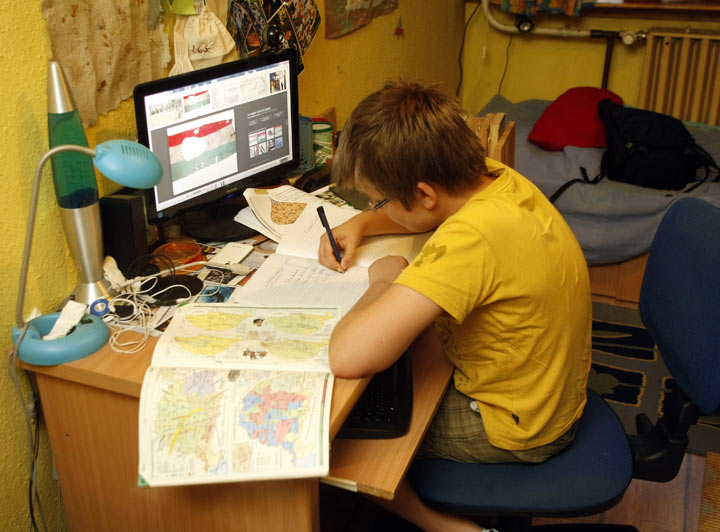TORONTO – Canada’s highly-connected youth have fewer rules than ever surrounding their online activities, but parents’ involvement can have a huge impact, according to a new national study.

On Wednesday, MediaSmarts – a non-profit charitable organization focusing on digital and media literacy – released Life Online, a comprehensive national survey examining youth Internet use in Canada.
READ MORE: Canada’s youth are highly connected, girls face different rules online
In 2013, MediaSmarts conducted a national survey of 5,436 Canadian students, grades 4 through 11, in 140 schools. The purpose of the study was to examine the online behaviours and habits of Canadian youth, exploring how they connect and learn online and how they feel about issues such as online privacy, security and cyberbullying.
Some study findings:
- 99% of all students have access to the Internet outside of school
- 6% rely on computers at public libraries and community centres
- 39% sleep with their cellphone
- 60% of boys access the Internet through a gaming console
- 80% of students said they rarely or never have an adult in the room when online
- Girls face stricter parental rules online
- Canada’s youth say they are aware of potential risks online
Parental supervision, online rules on the decline
- ‘Shock and disbelief’ after Manitoba school trustee’s Indigenous comments
- Canadian man dies during Texas Ironman event. His widow wants answers as to why
- Several baby products have been recalled by Health Canada. Here’s the list
- ‘Sciatica was gone’: hospital performs robot-assisted spinal surgery in Canadian first
One of the key findings in the study was that the majority of students rarely have an adult in the room when they are online.
“When you look at the overall survey, 80 per cent told us that they were either rarely or never supervised,” said Matthew Johnson, MediaSmarts’ director of education.
Nearly one third of younger students said they never sit with a parent or adult when online.
Johnson told Global News this finding goes hand-in-hand with another key finding – that across the board, there were fewer rules in place for students’ online activities.
The study found that 84 per cent of students said their parents had at least one rule in place around using the Internet, a decrease since 2005.
The most common rules include: posting contact information online, talking to strangers online or on a cellphone, avoiding particular websites and treating other people with respect.
Girls are more likely to have rules put in place by parents regarding their online activities.
READ MORE: Canadian girls face different rules online, study shows
Parents play a positive role in online activities
As was also found in the 2005 survey, the more parental rules students reported correlates with less risky online behaviour.
For instance, more students who have rules in place about not visiting certain websites never visit gambling sites (94 per cent versus 88 per cent without the rule in place) or look for porn online (86 per cent compared to 72 per cent without the rule). Students with rules in place about not contacting personal contact information are less likely to do so (78 per cent said they never do, compared to 64 per cent without this rule).
Johnson said the study findings reinforce the difference parental involvement can make. Almost half (45 per cent) of all students said they learn about issues such as cyberbullying, online privacy and online safety from their parents.
“What we know is that parents make a difference, we know that having rules in place has a measurable effect on what kids do online, and promotes positive online behavior,” said Johnson.
“So I think this really is a reminder that parents need to be involved in what their kids are doing online and of course that they need to be given the tools to stay informed about kids’ online issues and be able to have these conversations with their kids,” he said.
The study found that more and more kids are accessing the Internet through mobile devices, something which presents a challenge to parents.
“It’s much harder to supervise, to even be there as a support, when the computer can be anywhere,” said Johnson.
He said the advise he used to give parents – keeping computers in public parts of the house – is very hard to enact in today’s mobile world.
“We have to find new ways for parents to be involved in their kids’ lives. And really the only way to do that is to have early and ongoing conversations about the issues and the challenges that young people face.”
Canada’s youth are plugged in
One surprising figure released in the study was that 39 per cent of all students said they slept with their cellphones, just in case they received a text or message overnight. In grade 11, that figure increases to 51 per cent.
Johnson said this phenomenon highlights kids’ fear of missing out.
“There’s a fear that something will happen when you’re not there. There’s a concern about being out of the loop, there’s a concern that when you’re not present you can’t defend yourself,” Johnson told Global News.
But sleeping with a cellphone may also indicate where children are learning about online habits. Children may be learning this behaviour from adults.
“We have adopted cellphones and smartphones just as readily and when you see everyone in the house on their phones, there’s no question where kids are getting the message about what’s important,” Johnson said.
The important thing for parents to know is that their kids look to them for guidance, Johnson said.
“Talking about these issues, and setting and negotiating rules is an effective way of helping keep kids involved in positive online activities and helping to keep them from getting involved in harmful activities,” he said.


Comments